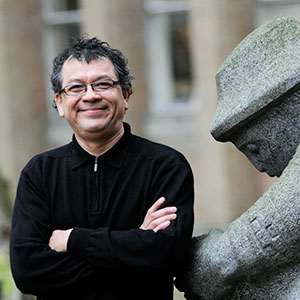If you’re committed to furthering the development of sustainable managed agroecosystems, UBC’s graduate programs in Plant Science are where you want to be. This is where you can go deep in the area of plant biology, advancing your studies and conducting applied research in plant production, protection, biotechnology, physiology and biochemistry, as well as in plant-environment interaction. We place high value on an interdisciplinary approach, so you’ll have the opportunity to collaborate with faculty in other graduate programs as you examine solutions to some of today’s most challenging problems.
PhD: Plant Science – Doctor of Philosophy – Postgraduate / Graduate Degree Program – UBC Grad School
MSc: Plant Science – Master of Science – Postgraduate / Graduate Degree Program – UBC Grad School
What you need to know
Our Plant Science graduate program places your scholarly advancement squarely in your own hands: in consultation with your research supervisor, you will tailor your studies to your particular professional goals and research interests. The collaboration doesn’t end there, though. You have the opportunity — and are encouraged — to develop your research program through an interdisciplinary approach involving other departments and faculty on campus, broadening your knowledge in a way that’s reflected in real-world systems. Another plus? You’re studying in British Columbia, where the diversity of plant agriculture gives you an enormous range of cropping systems to choose from that are most suitable for your thesis research.
UBC offers excellent facilities for your thesis research right here on the UBC campus, in the MacMillan Building, the Centre for Sustainable Food Systems at UBC Farm, Totem Field Laboratory, the UBC Wine Research Centre, the Michael Smith Laboratories and the Horticulture Glasshouse. Some Plant Science graduate students also work with our adjunct professors, many of whom are spread throughout the province of British Columbia.
The Plant Science Program offers degrees in fundamental and applied topics related to plant production, plant protection, biotechnology, plant physiology and biochemistry, and plant-environment interactions.
Specific areas of specialization include:
- plant-microbe interaction, bacterial and fungal diseases, plant virology, biological control of pests and diseases, insect physiology, natural insecticides, insect ecology and behaviour, and weed biology, ecology and control;
- seed physiology, plant nutrition, plant growth analysis, plant-plant interaction, biotic and abiotic stressor resistance, and environmental plant physiology;
- vegetable culture, ornamental horticulture, plant breeding, and post-harvest physiology;
- plant biochemistry, tissue culture, genetic engineering, and plant, fungal, and viral molecular genetics;
- rangeland ecology and wildlife habitat studies.
Applicants to UBC graduate programs should have academic backgrounds within the minimum academic requirements listed by the Faculty of Graduate and Postdoctoral Studies.
MSc
The MSc program requirements are as follows:
- Completion of the MSc program requires a thesis (12 or 18 credits) plus coursework, for a total of 30 credits.
- With a 12-credit thesis, students can include a maximum of 6 credits of senior undergraduate courses.
- With an 18-credit thesis, students can include a maximum of 3 credits of senior undergraduate courses and a maximum of 3 credits of directed study.
PhD
The PhD program requirements are as follows:
- Appropriate coursework will be selected in consultation with the candidate’s committee.
- All candidates are required to take a comprehensive examination.
- The major requirement for the PhD is completion of a research thesis demonstrating the ability to conduct significant and original scientific research.
Faculty Members

Zelalem Taye
Assistant Professor,
Applied Biology (Soil and Plant Science)

Marco Todesco
Associate Member, Plant Science and Applied Biology

Thorsten Knipfer
Assistant Professor, Applied Biology (Plant Physiology)

Risa Sargent
Associate Professor, Applied Biology

Andrew Riseman
Associate Professor, Applied Biology and Plant Breeding

Eduardo Jovel
Associate Professor, Applied Biology

Simone Castellarin
Associate Dean, Research
Professor, Applied Biology
Canada Research Chair (Tier 2) in Viticulture
Associate Director, Wine Research Centre

Juli Carrillo
Associate Professor, Applied Biology
Collaborations
The program is enriched through collaboration with colleagues in other UBC graduate programs such as Food Science, Soil Science, Botany and Zoology; in facilities such as the UBC Botanical Garden and Centre for Plant Research; and with agencies such as Agriculture and Agri-Food Canada, and the British Columbia Ministry of Agriculture and Land.
Got Questions?
Whether you’ve got questions about your program, your experience or your next steps, Graduate Student Services is here to help. Get in touch.
Where Can a Graduate Degree in Plant Science Take You?
Graduates of the Plant Science MSc and PhD programs have developed the following careers:
- at universities or colleges;
- in consulting; and
- in the rapidly expanding biotechnology and greenhouse industries.
Others have obtained research or management positions with:
- Agriculture and Agri-Food Canada; and
- the BC Ministry of Agriculture and Land.
Research Updates
Sowing the Seeds for Resilient Production Systems
While Dr. Andrew Riseman takes a lengthy view of the research topics he tackles at the Centre for Sustainable Food Systems at UBC Farm (CSFS), many of the real world challenges in his field are arising more often and becoming more dramatic.
Drought Solutions for Producers Start Small
Understanding and addressing agriculture’s biggest climate change challenges starts at the microscopic level for plant physiologist Dr. Thorsten Knipfer.
Earth Day: Looking at Long-Term Food Production
For Earth Day, we're highlighting plant physiologist Thorsten Knipfer who is working to understand how we can sustainably manage one of the most important natural resources on our planet, water.
